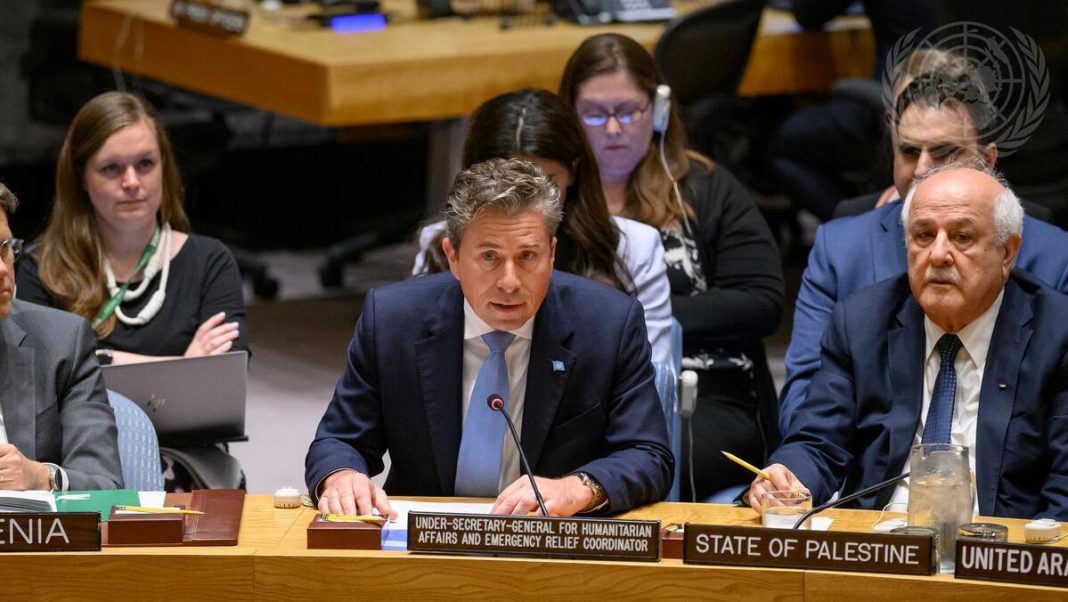Tom Fletcher, the former Principal of Hertford College, addressed the United Nations (UN) Security Council on 13th May. In his new role as Under-Secretary-General for Humanitarian Affairs and Emergency Relief, Fletcher urged the Council to “act – decisively – to prevent genocide” in Gaza.
As Under-Secretary-General, Fletcher leads the Office for Coordination of Humanitarian Affairs (OCHA), the UN body responsible for coordinating international responses to complex emergencies and natural disasters. This includes the delivery of aid to Gaza.
In his speech, Fletcher briefed the Council about the ongoing aid crisis in Gaza. He emphasised that, in the last ten weeks, little aid has entered the territory, 70% of which is either within Israeli-militarized zones or under displacement orders. As a consequence, “every single one of the 2.1 million Palestinians in the Gaza Strip face the risk of famine. One in five face starvation.”
Fletcher began by asking the Council “what action we will tell future generations we each took to stop the 21st century atrocity to which we bear daily witness in Gaza.” This remark has subsequently sparked an open letter by the parent of an Oxford student who faces disciplinary action following the occupation of Vice-Chancellor Irene Tracey’s office on 23rd May 2024.
The letter appealed to Fletcher to call on the Vice-Chancellor, in the same way that he appealed to the Security Council, “to consider how future generations might judge her decision to prosecute students acting on their moral indignation about events in Gaza and to terminate the university’s proceedings against them.”
Fletcher went on to describe the dire state of Gaza’s medical system before urging the Council to let OCHA and other aid agencies resume humanitarian aid distribution. He said: “we have a plan. We have shown we can deliver, with tens of thousands of trucks reaching civilians during the ceasefire. We have life-saving supplies ready, now, at the borders. We can save hundreds of thousands of survivors. We have rigorous mechanisms to ensure our aid gets to civilians, and not to Hamas. But Israel denies us access, placing the objective of depopulating Gaza before the lives of civilians.”
Fletcher also reminded the Council of Israel’s obligations under humanitarian law, and drew attention to the growing violence in the West Bank where he described the situation as “the worst in decades” with “the use of heavy weaponry, military methods of war, excessive force, forcible displacement, demolitions and movement restrictions”.
In his concluding remarks, Fletcher said: “Humanity, the law and reason must prevail. This Council must prevail. Demand this ends. Stop arming it. Insist on accountability.
“To the Israeli authorities: stop killing and injuring civilians. Lift this brutal blockade. Let humanitarians save lives. To Hamas and other armed Palestinian groups: release all hostages immediately and unconditionally. Stop putting civilians at risk during military operations.”
Since his address last Tuesday, Fletcher has been criticised for using the term “genocide” to describe the ongoing humanitarian crisis in Gaza. In an interview with the Associated Press (AP), Fletcher defended his use of the term, saying that he wanted to “make sure that we aren’t making the mistake that was made with previous massive breaches of international law, where it hasn’t been called out soon enough”.
He told the AP that: “I’m not a lawyer. I’m a humanitarian. My job is to get the aid in, to get the attention of the world, to help create the conditions to get that aid in and save as many lives as possible before it’s too late.”
Danny Danon, Israeli Ambassador to the UN, addressed the media after Fletcher’s address to the Security Council last Tuesday. He said that “instead of admitting that the existing distribution system has failed, the UN insists on preserving Hamas’ supply pipeline.”
Danon went on to say that “This is not neutrality – this is support for terrorism. Israel will not cooperate with a mechanism that strengthens those who kidnapped, murdered, raped and tortured our citizens.”
The UN has stressed, repeatedly, that only a court can make the decision that genocide has been committed.
Fletcher was Principal of Hertford from 2020 to 2024, where he completed his undergraduate in Modern History. Before returning to Hertford as Principal, Fletcher was a diplomat and British foreign policy advisor, serving as British Ambassador to Lebanon between 2011 and 2015.


